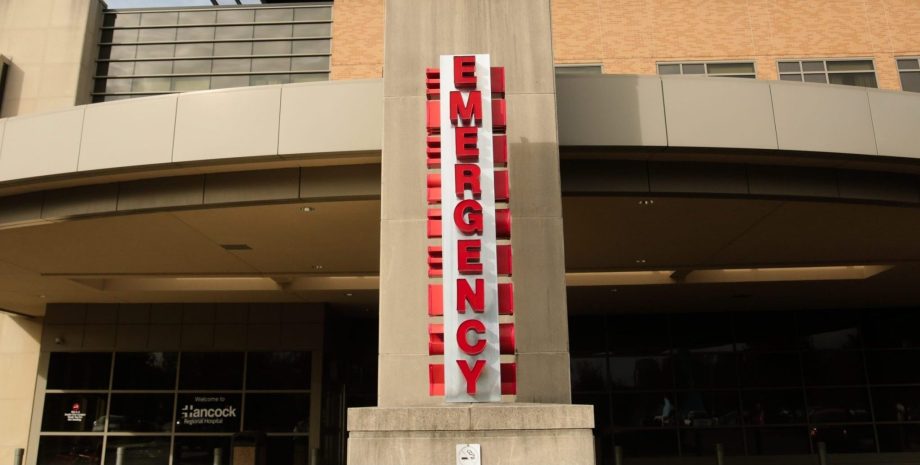

So if you’re experiencing an emergency—a possible heart attack, stroke, broken bone, difficulty breathing, or a serious mental health issue—call 911 or come to our emergency room, just as you would’ve before COVID-19.
We’re telling you this because, as our staffs have cared for COVID-19 patients over the past few weeks, they’ve noticed a downturn in the other emergencies they usually handle.
“I’m hoping that doesn’t mean that people are staying home and, in a week or two, we’ll find out that they had an incident or episode of something that they didn’t get treated for,” said Dr. Meg Fitzsimmons, a family and primary care physician at Hancock Family Medicine. “We want everyone to know the emergency rooms are fully functional—people should not hesitate to go if they think they have a true emergency.”
And because of COVID-19 precautions and the need for social distancing, emergency room patients are moving through the intake process faster than normal, she said. They are being taken immediately to private rooms, which are separated into two types: rooms for patients with non-COVID emergencies and others for possible coronavirus patients.
If you’re questioning whether to seek emergency care, here are 12 reasons to do so:
- Difficulty breathing, shortness of breath
- Chest or upper abdominal pain or pressure
- Fainting, sudden dizziness, sudden weakness
- Sudden changes in vision
- Confusion or changes in mental status
- Sudden or severe pain
- Uncontrolled bleeding
- Severe or persistent vomiting or diarrhea
- Coughing or vomiting blood
- Suicidal or homicidal feelings
- Stroke-like symptoms—slurred speech, drooping on one side of the face
- Possible broken bone
But maybe you’ve got an issue that doesn’t exactly fit into any of those descriptions, and you aren’t sure whether it’s best to call your primary care physician, 911, or go to the emergency room. With those concerns in mind, Dr. Fitzsimmons answered a few additional questions:
With COVID-19 still an issue, how should possible emergencies be handled if we’re not sure about calling 911 or going to the hospital emergency room?
A: Really, your decision-making should be just the same as it was prior to COVID-19. You can call your doctor, or you can call 911. If you call 911, first responders will come to your home, they can assess a person and determine whether it’s truly an emergency.
And if you think you’ve got a COVID-19 emergency (someone with a high fever and difficulty breathing), go to the emergency room or there is another option: call our coronavirus hotline: 317-325-COVD (2683).
When patients go to the emergency room for a non-COVID reason, should they be concerned about contracting the virus while they’re there?
A: Safety and hygiene are our priorities, so we’re taking all of the recommended precautions to keep everyone healthy.
In our physicians’ offices and in the emergency rooms, we have separated exam rooms for non-COVID patients from the ones used by COVID patients. And, as we always do, we’re sanitizing every room after we use it. Also, when we treat suspected COVID patients, we are closing those exam rooms for a few hours before putting another patient in them. And everyone is wearing masks, including patients.
What if there’s a mental health emergency?
A: If it’s extreme—someone with suicidal thoughts or extreme behavior—call 911.
Otherwise, virtual medicine is blossoming right now because of COVID-19. The mental health space is really conductive to telephone and video appointments because people can stay at home and call their doctor. It’s not an issue of having to physically examine patients.
When it comes to non-emergency mental health issues, when is it time to seek professional help?
A: This pandemic really preys on people’s fears and anxieties, and we are finding that those issues are getting exacerbated, especially for people who had them before COVID-19. People are stuck at home. They’re isolating. And the normal things they would do to self-sooth aren’t happening. So if worries snowball into focusing on them continually, to the point that a person can’t do their normal daily activities, then it’s time to call a therapist or their primary care physician.
Here are a few symptoms to look for:
- Not sleeping night after night or sleeping too much
- Panic attacks
- Worrying constantly about contracting COVID-19 or having someone in the family contract it
- Worrying constantly about job loss
We hope these guidelines help our Hancock Health community, navigate any emergencies you, or your loved ones, face in the coming days and weeks. And, rest assured, if you call any of our doctors’ offices or come to our emergency room with an issue, you’ll get the best medical care available.
Dr. Meg Fitzsimmons’ office is located at Hancock Family Medicine, 8535 North Clearview Drive, Suite 200, McCordsville. She can be contacted at 317-477-6400.